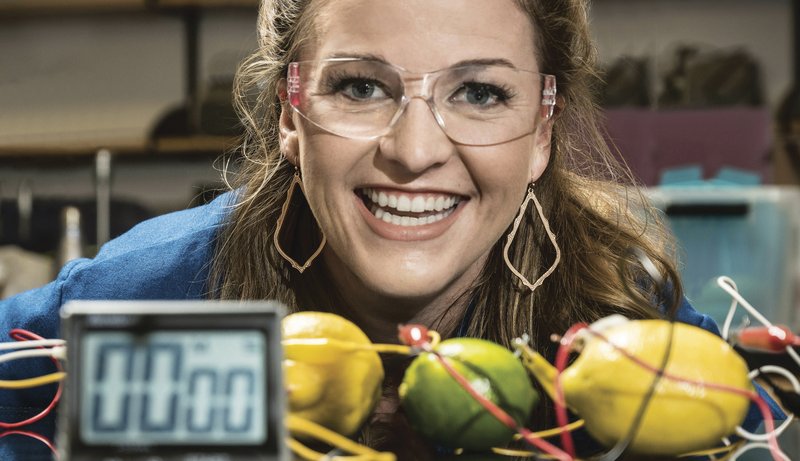If your housebound family needs a new diversion, follow Kate Biberdorf's example and try a hands-on approach to something besides a video game controller.
Biberdorf, who wears the snappy nickname Kate the Chemist, wants kids to have messy fun with science experiments.
The University of Texas at Austin chemistry professor is a lively promoter for the value of her discipline and the joy she finds in it. She's made her case on Today and other TV shows and barnstorms the country to get youngsters, especially girls, hooked on its wonder and possibilities.
Biberdorf is adding a new chapter with her first books. Kate the Chemist: The Big Book of Experiments has 25 entertaining projects for children ages 8 to 12 who end up learning about — shhhh! — energy and matter. Safely done at home, the experiments rely on common products including dish soap and baking soda, with a dash of glitter thrown into the "puffy slime" formula. An adults-needed icon marks ones requiring supervision.

Biberdorf also has written (with Hillary Homzie) Kate the Chemist: Dragons vs. Unicorns, the first in a planned fiction series featuring a 10-year-old Kate as an intrepid problem solver. How could her school musical include a fire-breathing dragon if Kate couldn't devise liquid nitrogen cheese puffs as a stand-in for flames?
Both titles are from Philomel Books, a Penguin Random House imprint, and were released early for antsy parents and kids alike.
In a phone interview, Biberdorf explained who nurtured her passion for chemistry in her hometown of Kalamazoo, Michigan, and her efforts to do the same for new generations. Remarks were edited for clarity and length.
AP: How did science capture your interest?
Biberdorf: My mom saw that I liked to explore and maybe had an engineering side of my mind. So she cleared one bathroom and made it so everything was perfectly safe and we could mix together shampoo and conditioner and soap and all this fun stuff in a huge green bowl. I've always been a little bit of a scientist and liked to see what happens if you add A plus B, what are you going to get? But it wasn't until my sophomore year of high school that I realized chemistry was my true passion, and I have to credit my teacher, Mrs. (Kelli) Palsrok. She made chemistry come alive for me.
AP: You said that the gender gap in the sciences grows as students advance and is widest at the PhD level. Why is that and how can it be addressed?
Biberdorf: There are a lot of reasons. If you're a young girl and you raise your hand (in class) and give an incorrect answer and a boy makes fun of you, that can have a crippling effect on your self-esteem. My mission is to get out there and talk to these girls so that they're passionate about science. Then when they do inevitably give a wrong answer, because we're all human, they have enough confidence to not be knocked down and are still interested.
AP: What changes need to happen for women in the scientific ranks?
Biberdorf: Female scientists are supporting other female scientists, and we are banding together and forming this beautiful community. We're supporting each other's research and talking about each other's projects in such a positive way. I personally feel so empowered to be part of this that I can't even wait to see what's going to happen in the next 10, 20, 30 years.
AP: Does the skepticism some are now voicing about science concern you?
Biberdorf: As the scientific community, we need to step up. We need to speak out. We need to use our voices and our credentials to explain what's happening. So, for example, with climate change and the coronavirus, if there are questions in your community about it, we need to be responsible scientists. We've got to make sure that the accurate information is going out to our communities.
Style on 04/27/2020
